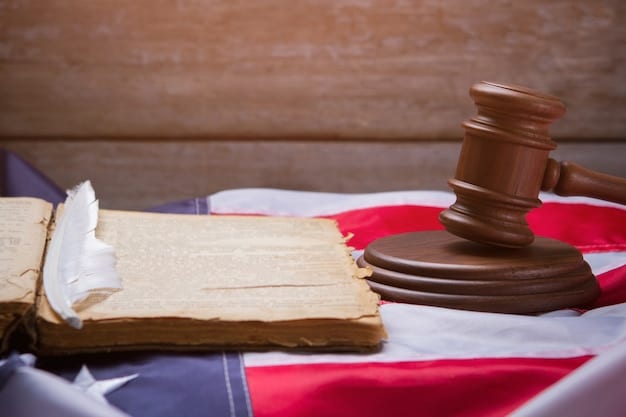The Latest on the Impeachment Inquiry: Key Developments & What It Means

The Latest Developments in the Impeachment Inquiry: What You Need to Know Now involves an investigation process initiated to determine if there’s sufficient evidence to impeach a government official, typically the U.S. President, for alleged misconduct.
Stay informed on the latest developments in the impeachment inquiry: What You Need to Know Now. We’ll break down key events, analyze the implications, and keep you updated every step of the way.
What is an Impeachment Inquiry?
An impeachment inquiry is a formal investigation into potential misconduct by a government official. The House of Representatives initiates this process to determine if there are grounds for impeachment, a process that can lead to the official’s removal from office.
This inquiry involves gathering evidence, interviewing witnesses, and reviewing documents. If the House finds sufficient evidence, it can vote to impeach the official, sending the matter to the Senate for a trial.
Key Players in an Impeachment Inquiry
Understanding who’s involved is crucial to following the developments. Here are some key roles:
- House of Representatives: They initiate the inquiry and vote on impeachment.
- Senate: Holds a trial to determine if the official should be removed from office.
- Witnesses: Provide testimony and evidence.
- Legal Teams: Represent both sides, presenting arguments and evidence.
The impeachment process is outlined in the Constitution and serves as a check on the power of the executive and judicial branches.

In summary, an impeachment inquiry is a serious process that can have significant consequences for the official involved and the country as a whole.
Grounds for Impeachment
The Constitution specifies the grounds for impeachment as “treason, bribery, or other high crimes and misdemeanors.” These terms are open to interpretation, leading to debates about what constitutes impeachable offenses.
High crimes and misdemeanors don’t necessarily have to be violations of criminal law. They can also include abuses of power, dereliction of duty, and other serious misconduct.
Historic Examples of Impeachment Grounds
Looking at past impeachments can provide context. Here are some examples:
- Andrew Johnson: Impeached for violating the Tenure of Office Act.
- Richard Nixon: Faced impeachment for obstruction of justice and abuse of power.
- Bill Clinton: Impeached for perjury and obstruction of justice.
- Donald Trump (twice): First impeachment for abuse of power and obstruction of Congress, second for inciting an insurrection.
Each case involved different allegations and interpretations of what constitutes an impeachable offense. These examples highlight the complexities and political nature of the impeachment process.
The Impeachment Process: A Step-by-Step Guide
The impeachment process is complex, involving multiple steps and both houses of Congress. Here’s a breakdown of the key stages.
First, the House of Representatives initiates an inquiry, gathering evidence and interviewing witnesses. If they find sufficient evidence, they draft articles of impeachment.
Steps in the Impeachment Process
Here’s the step-by-step breakdown:
- House Inquiry: Investigation and evidence gathering.
- Articles of Impeachment: Formal charges drafted by the House.
- House Vote: A majority vote in the House is required to impeach.
- Senate Trial: The Senate holds a trial to determine guilt or innocence.
- Senate Vote: A two-thirds vote in the Senate is required to remove the official.
If the Senate votes to convict, the official is removed from office. Otherwise, they are acquitted and remain in their position.

In conclusion, understanding these steps is essential to following any impeachment inquiry.
Recent Impeachment Inquiries in US Politics
Recent US history has seen several high-profile impeachment inquiries. These cases have had significant political and social impacts, shaping the course of American politics.
Examining these inquiries provides a clearer understanding of the impeachment process and its potential outcomes. They also illustrate the highly partisan nature of impeachment proceedings.
Examples of Recent Inquiries
Here is a brief look at some recent cases:
Recent years have been marked by heightened political tensions, leading to several notable impeachment inquiries. Understanding these events is crucial for grasping the current state of US politics.
- Donald Trump (First Impeachment): Accused of abusing his power and obstructing Congress related to dealings with Ukraine.
- Donald Trump (Second Impeachment): Charged with inciting an insurrection following the January 6th Capitol attack.
These inquiries highlight the political divisions within the US and the ways in which impeachment can be used as a tool to hold officials accountable.
The Role of Public Opinion in Impeachment Inquiries
Public opinion plays a crucial role in impeachment inquiries. Public sentiment can influence the actions of elected officials and shape the outcome of the impeachment process.
High public support for impeachment can put pressure on members of Congress to take action. Conversely, strong opposition can make it more difficult to proceed with impeachment.
How Public Opinion is Measured
- Polls: Surveys can gauge public sentiment on impeachment.
- Media Coverage: The way the media frames the issue can influence public opinion.
- Social Media: Platforms for people to express their views and organize protests.
Public opinion is just one factor in the impeachment process, but it can be a significant one. Elected officials often pay close attention to public sentiment when making decisions about impeachment.
As public opinion evolves, so too can the political landscape surrounding impeachment inquiries.
The Impact of Impeachment Inquiries on US Politics
Impeachment inquiries can have profound and lasting impacts on US politics. They can shape public discourse, influence election outcomes, and alter the balance of power between the branches of government.
These inquiries often expose deep divisions within the country and can lead to increased political polarization. They can also lead to reforms and changes in government practices.
Long-Term Effects of Impeachment
The long-term effects are often significant:
Impeachment inquiries have the power to reshape the political landscape of the United States, leaving an indelible mark on the nation’s history.
- Political Realignment: Can shift voter allegiances and reshape political parties.
- Legislative Changes: May lead to new laws and regulations.
- Historical Perspective: Impeachment inquiries become part of the historical record.
Ultimately, impeachment inquiries serve as a powerful check on executive power, but their impacts extend far beyond the immediate political circumstances.
| Key Point | Brief Description |
|---|---|
| 🏛️ Impeachment Inquiry | Formal investigation by the House of Representatives into potential misconduct by a government official. |
| ⚖️ Grounds for Impeachment | Constitutionally defined as treason, bribery, or other high crimes and misdemeanors. |
| 🗳️ Impeachment Process | Involves House inquiry, articles of impeachment, House vote, Senate trial, and Senate vote. |
| 📢 Public Opinion | Plays a crucial role, influencing elected officials and shaping the outcomes of impeachment processes. |
Frequently Asked Questions
▼
The House initiates the impeachment inquiry, gathers evidence, and votes on whether to impeach the official. A majority vote is required to impeach.
▼
The Senate holds a trial to determine if the official should be removed from office. A two-thirds vote is required for conviction and removal from office.
▼
These are serious offenses that can include abuses of power, dereliction of duty, and other forms of misconduct. They don’t necessarily have to be criminal.
▼
Public opinion can influence the actions of elected officials and shape the outcome of the impeachment process. High public support can pressure Congress to act.
▼
If an official is impeached by the House and convicted by the Senate, they are removed from office and may be disqualified from holding future office.
Conclusion
Staying informed about impeachment inquiries is crucial for understanding the checks and balances within the US government. By following the latest developments and understanding the key processes, you can better engage with and interpret US politics.





